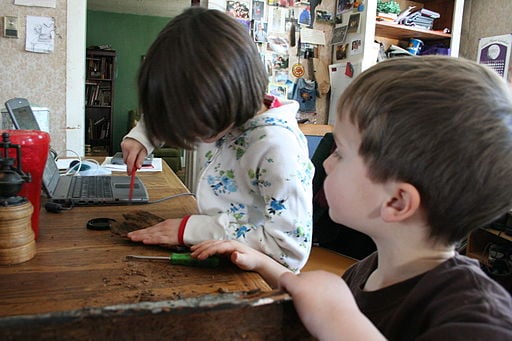“Can we please focus?!”
This is a plea the boys hear many times during a typical morning. And the answer always appears to be no. They are too busy trying to stay in their seats, sometimes literally gripping the sides to keep from bouncing up. They are too distracted by their brother’s work and what number he is on and using that information to prove something about their innate goodness or lack thereof. They can not stop rolling the pencil back and forth across the table, apparently entranced by the way the six-sided instrument both rolls AND clicks.
And it drives me nuts. Even more than the disobedience, more than the whining and complaining, their inability to control themselves and focus for more than 38 seconds makes me feel insanely angry.
This morning, we were planning a Chinese children’s game that the boys love. For each round, you are assigned a role and must keep it a secret in order for the game to work. Well, each and every round Zachary blurted out what role he was playing before we could continue.
This does not bode well for his future ability to resist heroin. Or pretty girls. Or advertisements for luxury cars. In a now famous experiment, The Marshmallow Test, described in the book Mind in the Making, 4-year-olds who cannot resist eating ONE marshmallow, even when they are promised TWO marshmallows if they do wait, are more likely to do drugs, drop out of school, and have low self-esteem. Check out the Marshmallow Test video here.
Mind in the Making is full of ideas on how to help your child resist the marshmallow and go to Stanford. You can help them invest in their interests in ways that require long-term focus and planning. You can play games that require focus and self-control: Simon Says, I Spy!, and difficult puzzles. You can join them in pretend play, where people have to inhibit their own impulses to stay in character. You can read about more ideas in the book, which I highly recommend.
What does 19th century Miss Mason have to say about all of this?
We’ll start with the habit of focusing attention, since the child’s intelligence the direct result of how well he can do this…So the child’s mind goes from glass to slipper to Cinderella to godmother to gift to boat to Uncle Harold to bifocals. This kind of sequence of association can be a useful servant, but a bad master. It can be helpful…when they use memory tricks to remember names. But to be at the mercy of those associations, to have no power to choose to turn it off and think what we want when we want, but only to be able to think about whatever thought pops into our head, makes us totally useless.
Her advice? Help young children focus on things, which are naturally interesting and will inspire focus, and not on words, which are far less interesting. As the child matures, you can introduce abstract lessons, but only in very small doses. We are incorporating two of her ideas into our days.
First, there is a schedule of short lessons in between more interesting hands-on activities. And if the boys stay focused, even for our short wordy lessons, we will stay on schedule, and there will be more time for free play before lunch. She calls it a natural consequence.
Second, we have extended, regular periods of nature study. We walk in the woods, sit by the river, and take bird watching books out into the backyard. During these times, The mother must resist too much talking. She can only point out a few things that might be worth paying attention to or notice what the child is paying attention to and asking a brief question. One fun idea is to spend 15 minutes in the backyard, and then have everyone come in and make a list of everything they remember seeing. We do these “studies” once a week, and both boys would be happy if we did them every day.
Here’s a final piece of wisdom from dear Charlotte, who advocates going out in all kinds of weather throughout the year:
Winter walks…afford many opportunities to develop the child’s habit of paying attention…But what about rainy weather? Rain, unless it’s really heavy, doesn’t harm children if they are dressed properly. They shouldn’t wear waterproof clothes because, although the rain will stay out, the skin won’t be able to breathe and being able to get rid of waste through the dampness of skin is a good way to ward off disease.
Good stuff.











